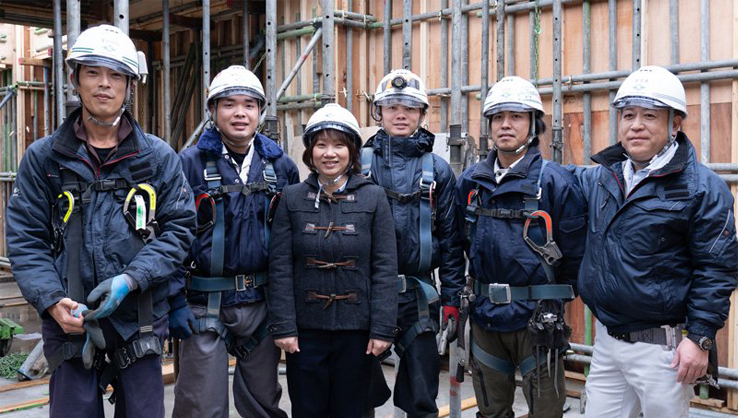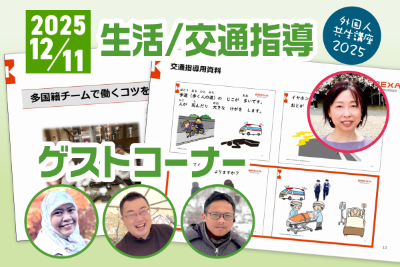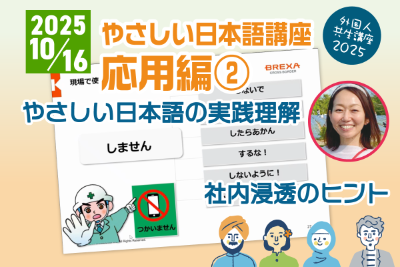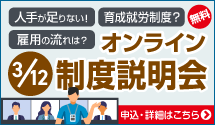- やさしい日本語
- ひらがなをつける
- Language
We provide multilingual content through machine translation. Translation accuracy is not 100%. About the multilingualization of the JAC website
- About JAC
- JAC Membership Information
- Specified Skilled Worker Acceptance
- Specified Skilled Worker Overview of the system
- 10 Mandatory Assistance for Foreigners
- Online individual consultation
- Seminar on Coexistence with Foreign Nationals
- Leading examples of host companies
- Case studies collection "Visionista"
- Foreigner's Voice
- Foreign Resident Acceptance Manual / Q&A
- Useful column "JAC Magazine"
- Acceptance support services
- Specified Skills Acceptance Support Service
- Skills improvement support
- Online Special Education
- Skill training
- Japanese Language Course
- Education and Training Support
- Subsidy system for obtaining qualifications
- Support for creating a comfortable workplace
- Temporary Return Support
- CCUS charge support
- Support system for promoting the accumulation of employment history
- Post-acceptance training
- Compensation system for Specified Skilled Worker (i)
- Daily life support
- Medical interpretation support
- Support for daily life problems
- freeJob matching
- The Specified Skills Evaluation Exam
- Home
- JAC Magazine
- The present and future of the construction industry
- STOP! Paid job placement services for construction work are prohibited in principle.
- Home
- JAC Magazine
- The present and future of the construction industry
- STOP! Paid job placement services for construction work are prohibited in principle.

STOP! Paid job placement services for construction work are prohibited in principle.
I wrote the article!
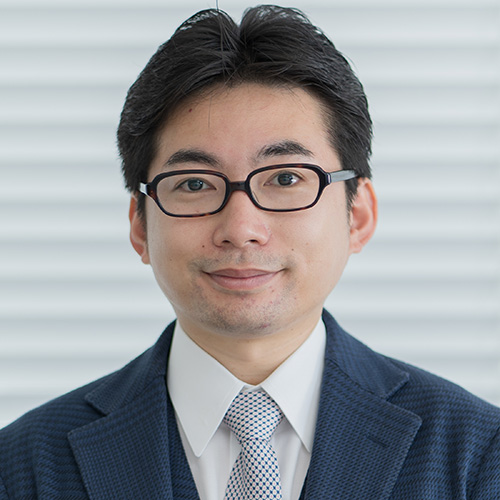
Global HR Strategy Law Firm
Representative Partner Lawyer
Lawyer / Immigration Bureau Registered Lawyer / Social Insurance and Labor Consultant
Shohei Sugita
(Sugita Shohei)

Did you know?
The Employment Security Act restricts paid employment placement businesses from introducing job seekers for construction work.
The Employment Security Law, Article 32-11, Paragraph 1, prohibits fee-charging employment placement businesses from introducing job seekers to jobs related to civil engineering, architecture, and other work involving the construction, remodeling, preservation, repair, modification, destruction or demolition of structures, or work involved in preparing for such work (referred to as "construction work").
The same law similarly prohibits port employment placement agencies from introducing job seekers for jobs in harbor transport work, and excludes the introduction of job seekers for construction work and port transport work from the scope of work that fee-charging employment placement agencies can handle.
Why is "construction work" excluded from the scope of paid job placement services?
"Construction work" is excluded from the range of occupations that paid employment placement businesses can introduce. "Construction work" is excluded not only from paid occupations, but also from labor dispatch businesses (Article 4, Paragraph 1, Item 2 of the Labor Dispatch Law).
The reason given is that while construction work is in reality being carried out under a multi-layered subcontracting relationship, the Construction Workers Employment Improvement Law (Law No. 33 of 1976) has taken measures to improve employment, such as clarifying the employment relationship and modernizing employment management so that the contract form is one in which the person who employs the workers and the person who gives instructions are the same, and it would be more appropriate to entrust it to such measures (Labor Administration Research Institute, Revised 2nd Edition, Labor Dispatching Law, p. 207). This reason explains why it is not subject to labor dispatch businesses, but the fact that it is more appropriate to entrust it to measures that have already been taken seems to be partly valid as a reason for excluding it from the scope of paid employment placement businesses.
What is the scope of "construction work" that is not covered by paid job placement services?
Construction work refers to "civil engineering, architecture, and other work related to the construction, remodeling, preservation, repair, modification, destruction, or demolition of structures, or work related to the preparation for such work." Furthermore, these works are limited to those directly engaged in such work at the construction site.
Therefore, jobs such as those performed by administrative staff at construction sites and construction management work, which involves creating construction plans for civil engineering and other construction projects and managing the construction of the project based on those plans, such as construction process management (management of schedules, construction order, construction methods, etc.), quality control (management to ensure that strength, materials, structure, etc. are in accordance with the design documents), and safety management (prevention of employee accidents, prevention of pollution, etc.), do not fall under construction work, and it is therefore possible to carry out paid employment placement services (Ministry of Health, Labor and Welfare, Employment Security Bureau, "Guidelines for the Operation of Employment Placement Businesses," page 13, April 2023).

What are the penalties for non-compliance?
As mentioned above, paid job referral services for construction work are prohibited by Article 32-11, Paragraph 1 of the Employment Security Law.
Article 32-11 A fee-charging employment placement business operator must not introduce to job seekers occupations in port transportation work (omitted), occupations in construction work (meaning civil engineering, architecture and other work related to the construction, remodeling, preservation, repair, alteration, destruction or demolition of structures, or work related to the preparation for such work), or other occupations specified by Ministry of Health, Labour and Welfare Ordinance as being likely to impair the protection of workers in such occupations by providing such employment in a fee-charging employment placement business.
② The provisions of Article 5-5, paragraph 1 and Article 5-6, paragraph 1 shall not apply to applications for employment and applications for work relating to the occupations prescribed in the preceding paragraph made by fee-charging employment placement business operators.
If a business operator violates Article 32-11, Paragraph 1, the business operator will fall under Article 64, Paragraph 4 of the Act below, and may be subject to imprisonment of up to one year or a fine of up to 1 million yen.
Article 64 Any person who falls under any of the following items shall be punished with imprisonment for not more than one year or a fine of not more than one million yen:
(iv) Any person who violates the provisions of Article 32-11, paragraph 1
If a business operator is providing paid employment placement services for construction work in violation of Article 32-11, Paragraph 1 of the Law, the Minister of Health, Labour and Welfare may issue Article 48-2 (guidance and advice) and Article 48-3 (improvement orders, etc.). If the business operator violates an order based on Article 48-3, Paragraph 1 of the Law, the business operator may be subject to imprisonment of up to six months or a fine of up to 300,000 yen under Article 65 of the Law.
Article 48-2 When the Minister of Health, Labour and Welfare finds it necessary for the enforcement of this Act, he/she may provide employment placement businesses, job seekers, persons recruiting labor, recruiters, persons engaged in businesses providing recruitment information, etc., labor supply businesses, and persons seeking to receive labor supply with the guidance and advice necessary to ensure the proper operation of their businesses.
Article 48-3. When an employment placement business operator, a person recruiting labor, a recruiter, or a labor supply business operator has violated the provisions of this Act or the provisions of orders thereunder in relation to the business of that business, the Minister of Health, Labour and Welfare may, if he/she finds it necessary to ensure the proper operation of said business, order such person to take necessary measures to improve the operation of said business.
② When the Minister of Health, Labour and Welfare finds that a job recruiter or a person seeking to supply labor has violated the provisions of Article 5-3, paragraph 2 or paragraph 3, or has made a factually inaccurate report in response to a request under the provisions of Article 5-5, paragraph 3, or has violated these provisions and is likely to continue to violate these provisions despite having received the guidance or advice under the provisions of the preceding Article, the Minister may recommend that said job recruiter or person seeking to supply labor take the necessary measures to correct the violation of the provisions of Article 5-3, paragraph 2 or paragraph 3, or Article 5-5, paragraph 3, or to take the necessary measures to prevent such violation.
Article 65 Any person who falls under any of the following items shall be punished with imprisonment for not more than six months or a fine of not more than 300,000 yen.
(vii) Any person who has violated an order under the provisions of Article 48-3, paragraph 1
As such, paid job referrals for construction work are prohibited in principle by law (※), and companies that are hiring must also be careful not to accept job referrals from businesses that violate the law.
*In some cases, this can be legally conducted as a paid construction work placement business.
What if I receive a paid job offer from a foreign country for construction work?
In principle, facilitating the establishment of an employment contract between an employer located overseas and a job seeker located in Japan, or between a job seeker located overseas and an employer located in Japan, is considered overseas employment placement, and if part of the act is carried out in Japan, it must be carried out by a business operator licensed for employment placement.
When an overseas agency solicits Japanese job seekers, the agency may not have the necessary licenses, such as a license to provide paid employment placement services.
However, it is difficult to take disciplinary action against a foreign corporation based on Japan's Employment Security Law, and it is expected that no disciplinary action will be taken.
But that's never acceptable.
★ Countermeasures ★
You should clearly tell them, "Under Japanese law, it is prohibited to introduce job seekers for construction work for a fee." If such a case occurs, please consult your local labor bureau.
What should I do if I receive an offer from a Japanese employment agency?
The other day, I received a call from a construction company to JAC, saying, "We will introduce Specified Skilled Worker for 40 to 450,000 yen."
If you receive a call like this offering to introduce a job to others, consider it a suspicious call.
It seems that the phone call is often hung up when you say, "Is job placement in construction work free?"
We have received calls saying, "We will handle everything from the payment of the acceptance fee to the application, procedures, and post-acceptance services," but the acceptance fee is actually paid by the receiving company to JAC or an affiliated regular member organization.
Therefore, you will never have to pay a recruitment agency.
Application procedures and other procedures are also handled by the host company.
It is possible to outsource the procedures for obtaining a status of residence to an intermediary, but this is limited to corporations or individuals who are authorized by law to act as intermediaries, such as lawyers or administrative scriveners.
If the other party realizes that you have the correct knowledge, they will not persistently approach you.
To avoid becoming a victim, if you have even the slightest suspicion, please feel free to contact the JAC Call Center.
【お問い合わせ先】
(一般社団法人)建設技能人材機構(JAC)コールセンター
Tel: 0120-220353(平日:9:00〜17:30)
[Read this article as well]
Calls such as "I will introduce Specified Skilled Worker for 40~450,000 yen" are coming in
Updated on December 6, 2022
The author of this article

Global HR Strategy Law Firm
Representative Partner Lawyer
Lawyer / Immigration Bureau Registered Lawyer / Social Insurance and Labor Consultant
Shohei Sugita
(Sugita Shohei)
Attorney (Tokyo Bar Association), lawyer registered with the Immigration Bureau, and certified social insurance labor consultant. After working as a special lecturer at Keio University Law School, special lecturer at the Center for Japanese Law Research and Education at Nagoya University Graduate School of Law (Vietnam), visiting researcher at Hanoi Law University, and working at a law firm, he is currently a managing partner at Global HR Strategy law firm, an international cooperation specialist at the Japan International Cooperation Agency (foreign employment/labor-related laws and immigration-related laws), and a researcher at the Keio University Law School and Global Law Institute.







